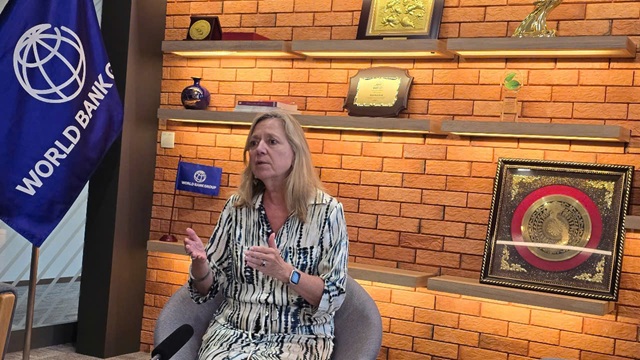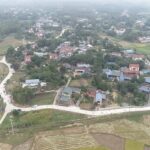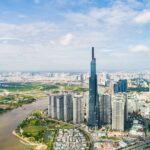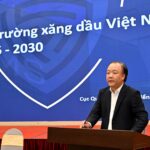 |
This statement was made by Mrs. Mariam J. Sherman, World Bank (WB) Director for Vietnam, Cambodia, and the Lao People’s Democratic Republic, during an interview with the Viet Nam Government Portal regarding Vietnam’s achievements, opportunities, and challenges in its new development phase, marking the 80th anniversary of the National Day of the Socialist Republic of Vietnam (1945-2025).
Vietnam has achieved one of the most impressive development stories globally.
Reflecting on Vietnam’s 80-year development journey and its remarkable economic achievements that have transformed the country into a middle-income economy with high openness in the region, Mrs. Mariam J. Sherman shared: “Since the Doi Moi (Renovation) policy in 1986, Vietnam has achieved one of the most impressive development stories globally. In less than four decades, the country has transformed itself from one of the poorest nations to a dynamic economy, graduating to a middle-income status.”
In the late 1980s, more than half of the population lived in extreme poverty; today, this rate has dropped to below 1%. Per capita income has increased sixfold, and life expectancy has risen by seven years compared to the early 1990s. Vietnam has deeply integrated into the global supply chain, with trade turnover equivalent to more than 160% of its Gross Domestic Product (GDP) – among the highest in the world.
These achievements are closely linked to the lives of Vietnamese people. The country’s labor force currently stands at about 57 million, with more than 20 million new jobs created after Doi Moi, over 80% of which are in the private sector.
From the WB’s perspective, I can assert that this is a story of vision, perseverance, and reform, delivering tangible results for the people of Vietnam. These achievements serve as a solid foundation for Vietnam to confidently strive toward its goal of becoming a high-income economy with green and inclusive growth by 2045.
WB is honored to accompany Vietnam from the early days of Doi Moi.
Speaking about the relationship between WB and Vietnam, Mrs. Mariam J. Sherman affirmed that the partnership between WB and Vietnam has spanned over three decades, almost as long as the country’s reform journey.
From the early days of Doi Moi, WB has been honored to accompany Vietnam through each transition phase. Since the 1990s, WB has worked alongside Vietnam in areas such as land governance, trade, investment, finance, and poverty reduction. These factors facilitated and laid the groundwork for Vietnam’s transition from a centrally planned economy to a market-oriented one.
Over the years, WB has provided nearly $26 billion in financing, along with policy advice and global knowledge sharing in key areas, to support Vietnam’s development priorities. WB has invested in infrastructure, education, healthcare, agriculture, and social protection, creating millions of jobs and expanding opportunities for people across the country. Notable projects include the electrification program (achieving a 99% coverage rate); rural transportation and water supply development; climate change response in the Mekong Delta; renewable energy development; a series of ten credit programs to support poverty reduction; support for building institutional foundations for the market economy; and the publication of the Vietnam 2035 and Vietnam 2045 vision reports.
Importantly, the cooperation between Vietnam and WB goes beyond financial support, encompassing global knowledge sharing, enabling Vietnam to both absorb international experiences and develop reform models suited to its domestic context. Currently, Vietnam has also been sharing its development experiences with many other countries.
WB is ready to accompany Vietnam in building an institutional system worthy of the 2045 vision.
Regarding institutional reform, Mrs. Mariam J. Sherman shared that successful high-income countries have a common denominator: an effective and accountable institutional system. Recently, Vietnam has taken significant steps, such as rearranging administrative units, merging ministries and sectors, and piloting e-government. These reforms will reduce procedures and improve efficiency in serving people and businesses.
In the next phase, as the economy grows larger and more complex, institutions need to be strengthened to sustain growth. The role of the state should shift from “direct intervention” to “creating a transparent, predictable, and rules-based environment” for the private sector to thrive.
A professional civil service with strong accountability mechanisms and better governance will enhance the efficiency of every investment dollar. WB is ready to accompany Vietnam in building an institutional system worthy of the 2045 vision.
Vietnam has achieved impressive per capita income growth.
When assessing Vietnam’s growth prospects amid global uncertainties, Mrs. Mariam J. Sherman affirmed that Vietnam enters this new development phase with several advantages, including a young workforce, stable macro-economy, and adaptability. However, the global context remains challenging due to heightened trade tensions and policy instability. WB forecasts global economic growth in 2025 to reach only about 2.3%. As an export-oriented economy, Vietnam will be directly impacted by supply chain shifts and new trade barriers.
In the past four decades, Vietnam has achieved impressive per capita income growth at a rate of 5.1% per year. However, to become a high-income country and achieve its goal of becoming a high-income nation by 2045, WB recommends that Vietnam maintain a per capita growth rate of around 6% annually over the next two decades. The path forward must focus on quality growth, driven by high productivity, innovation, modern infrastructure, a skilled labor force, and climbing the value-added ladder.
WB, along with the International Finance Corporation (IFC) and the Multilateral Investment Guarantee Agency (MIGA), provides comprehensive support for Vietnam’s development agenda. WB accompanies the government in building a stable policy environment to attract investment while directly providing finance, equity, guarantees, and risk insurance to encourage private capital inflows.
To achieve its sustainable development goals, the World Bank’s Director for Vietnam proposed several strategic priorities: First, promote private sector development to enhance productivity, create jobs, foster innovation, and increase national competitiveness. Second, reform higher education to improve human resources, meeting the demands of a knowledge-based economy. Third, continue investing significantly in key infrastructure sectors. Fourth, prioritize green growth, develop low-carbon industries, create green jobs, and protect the environment. Fifth, strengthen institutional capacity for effective policy implementation, and finally, ensure that growth goes hand in hand with reducing inequality so that all people benefit.
To materialize these priorities, Vietnam requires high-quality and transformative investments. WB is prepared to offer large-scale and long-term financing, flexible financial instruments, and global knowledge to support Vietnam’s acceleration toward becoming a high-income country by 2045.
Thach Hue
– 15:08 01/09/2025
“Experts: Progressive Policies are Only as Good as Their Implementation”
“Vietnam has long been lauded for its progressive reforms, and this is testament to the country’s forward-thinking policies. However, as Oliver Massmann, Managing Director of Duane Morris Vietnam and a veteran legal practitioner in the country for almost three decades, points out, the gap between policy formulation and implementation remains a challenge. The key issue, according to Massmann, is not a lack of new policies, but rather the pace of enforcement. Vietnam’s potential is undeniable, yet to fully unlock it, the country must address the disconnect between its ambitious plans and on-the-ground realities.”
The Birth of a Financial Hub: Ho Chi Minh City’s $7 Billion Vision
The Ho Chi Minh City Financial Center is an ambitious project, spanning the vibrant neighborhoods of Saigon and Ben Thanh (formerly District 1), as well as the thriving Thu Thiem urban area. With a total area of 783 hectares, this financial hub is poised to become a bustling epicenter of economic activity.




















